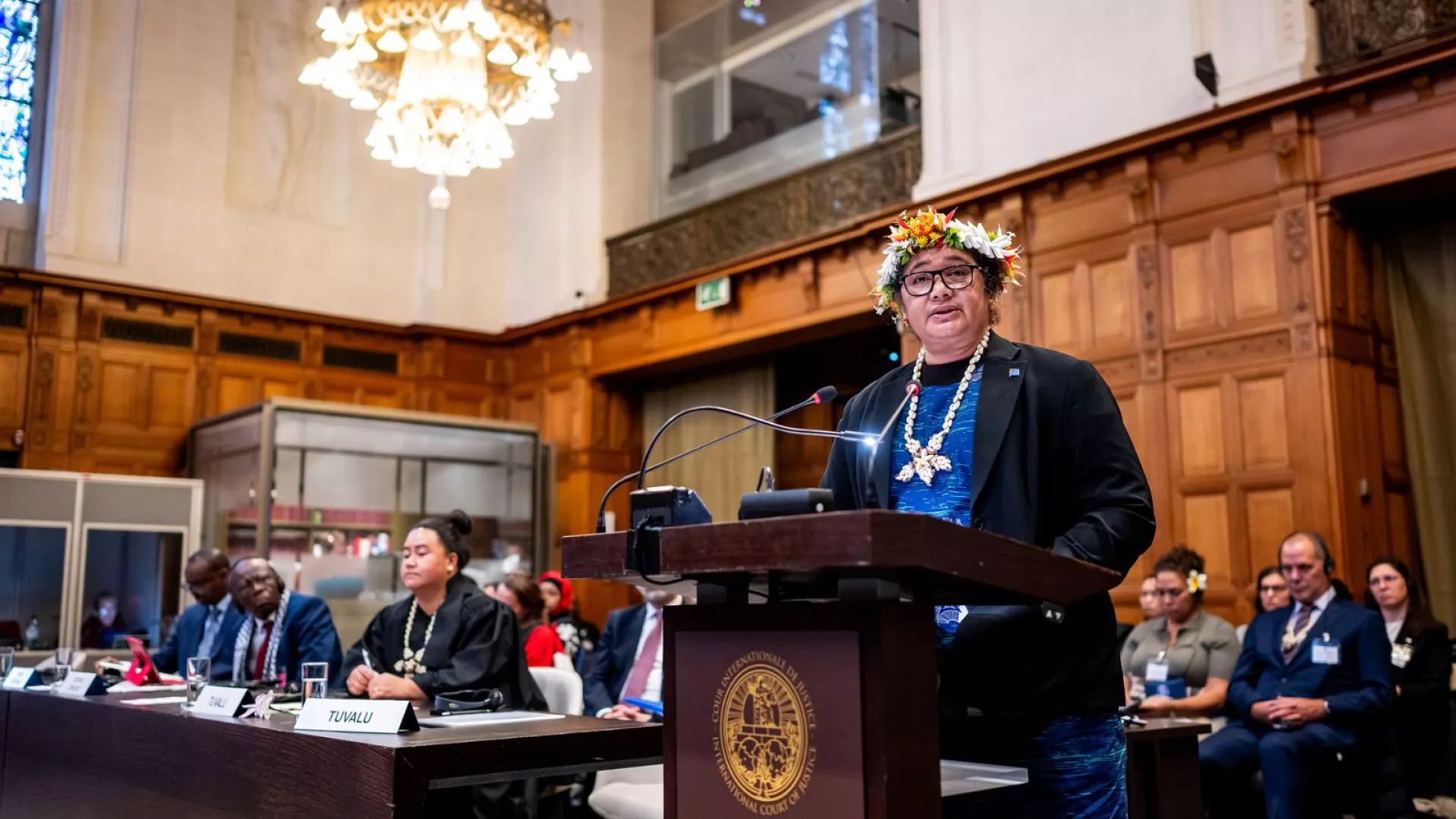
This blog post is Part 2 of a three-part series highlighting the main legal arguments presented during the hearings of the International Court of Justice (ICJ) on the advisory opinion request related to States’ obligations regarding climate change. Part 1 focused on discussions regarding applicable law, and the no-harm rule. Part 2 focuses on arguments relating to (i) climate change and human rights, (ii) extraterritoriality of climate rights, and (iii) State obligations under climate treaties.
Climate Change and Human Rights
Unsurprisingly, the link between climate change and human rights was a key point of contention during the oral hearings before the ICJ. Several States underscored that climate change can impair the enjoyment of human rights. For instance, Cameroon argued that climate change affects the rights to self-determination, life, access to water, food, health, private and family life, and development.
Several States, including Costa Rica, El Salvador, Ghana, Mexico, Slovenia, and Spain (among others), emphasized the relevance of the right to a healthy environment to address the legal questions at hand. Cameroon even urged the ICJ to confirm the existence of the right to a healthy environment as a customary international law norm. Spain stressed that Resolution A/76/L.75, in which the UNGA recognized the right to a clean, healthy, and sustainable environment, should be considered ‘as one of the key elements when interpreting instruments of conventional and customary law’ under Article 31 of the Vienna Convention on the Law of Treaties (VCLT).
Several representatives also emphasized that States have obligations to protect human rights from the adverse effects of climate change. For instance, Albania argued that States have obligations to (i) prevent significant harm to the climate system that could foreseeably violate human rights, (ii) ensure that the measures taken in response to climate change do not violate human rights, and (iii) provide redress for human rights violations. In this context, South Africa stressed that the preamble of the Paris Agreement ‘acknowledges that human rights should be considered when taking action to address climate change, especially when it comes to the protection of the rights of the most vulnerable persons.’
In contrast, several States questioned the applicability of human rights law or contended that they do not have obligations under human rights law to mitigate greenhouse gas emissions and ensure the protection of the climate system. For example, Canada argued that the ‘positive impact’ climate action could have on human rights ‘cannot be relied upon to broaden the scope of States’ obligations under international human rights law.’ Canada added that these obligations were not designed to address greenhouse gas emissions and ‘do not lend themselves to claims by any rights holder for the protection of the climate system.’
Germany argued that States fulfilling the Paris Agreement ‘simultaneously fulfill their human rights obligations.’ Germany also stressed that the right to a clean, healthy, and sustainable environment ‘does not yet form part and parcel of current customary international law.’ Similarly, the United States asserted that international law does not obligate States to mitigate anthropogenic greenhouse gas emissions ‘nor does it currently provide for a human right to a healthy environment.’ The United States further contended that this right lacks extensive and uniform state practice and opinio juris to support it.
Climate Rights and Extraterritoriality
States differed substantially on the issue of the extraterritorial applicability of human rights treaties. Several States asserted that the scope of States’ human rights obligations extends beyond their territorial borders. For instance, Kiribati argued that these obligations have an extraterritorial scope because greenhouse gas emissions can threaten the existence of States and violate their right to sovereignty. Seychelles and Chile also contended that human rights obligations extend beyond a State’s territory, urging the ICJ to consider the approaches of the Inter-American Court of Human Rights (IACtHR) and the Committee on the Rights of the Child, which recognize that the obligation to respect human rights extends to the harmful effects of greenhouse gases beyond a State’s territory if emitted under their control (see here and here).
The European Union also requested that the ICJ clarify the concept of ‘jurisdiction’ and the criterion of ‘effective control’ in the context of climate change. Germany cautioned that a broad interpretation could lead to an ‘unlimited expansion’ of States’ jurisdiction and ‘responsibilities towards people practically anywhere in the world.’ The German Constitutional Court and the European Court of Human Rights recently developed a narrow interpretation of the issue and did not allow for claims from non-citizens. Similarly, Canada emphasized that ‘the jurisdictional competence of a State is primarily territorial’ and that States may only incur extraterritorial obligations under international human rights law in specific exceptions. According to Canada, one such exception could be peremptory norms of customary international law (jus cogens), but environmental principles have not yet reached that status.
Obligations in the Climate Treaties
Due Diligence
The International Union for Conservation of Nature (IUCN) asserted that every State has the obligation ‘to do its utmost to limit global warming to 1.5°C, and to limit any overshoot as much as possible, and to reverse it.’ This temperature threshold is expressly included in Article 2 of the Paris Agreement. The IUCN added that this ‘is an obligation of stringent due diligence, and it varies according to States’ different responsibilities and capabilities.’ Several States, including Brazil, also emphasized that the principle of common but differentiated responsibilities and respective capabilities (CBDR-RC) should inform the interpretation of the expected degree of due diligence. For example, Brazil asserted that developing States should have a wider margin of discretion than developed States.
Obligation to Mitigate
Bangladesh, Sierra Leone, and Malawi, among others, also stressed the importance of States adopting ‘all necessary measures’ to avoid exceeding the 1.5 degree Celsius threshold. In particular, Malawi contended that the Paris Agreement temperature goal requires States to take concrete measures, such as adopting regulatory frameworks to reduce greenhouse gas emissions, enforcing these frameworks, conducting environmental impact assessments, and providing technical assistance to vulnerable States.
During the oral proceedings, the IUCN also argued that the Paris Agreement establishes the emission reduction pathway for limiting the temperature increase in its Article 4, paragraph 1. This provision requires State parties to ‘undertake rapid reductions’ in greenhouse gas emissions in accordance with the ‘best available science.’ The IUCN noted that, according to the reports of the Intergovernmental Panel on Climate Change (IPCC) and the global stocktake decision, ‘the only way to hold warming to 1.5°C is by deep, rapid and sustained reduction of global greenhouse gas emissions of 43 percent by 2030 and 60 percent by 2035, relative to 2019 levels.’ This statement was especially relevant given that, before the oral proceedings commenced, a group of authors of the IPCC reports met with members of the ICJ to improve the Judges’ understanding of the key scientific findings presented in the IPCC’s periodic assessment reports.
Obligation to Present Progressive NDCs and Fair Share Standard
The IUCN also affirmed that a core obligation to achieve the Paris Agreement’s temperature goal is to prepare, communicate, and maintain successive nationally determined contributions (NDCs) every five years. Under Article 4 of the Paris Agreement, these contributions must ‘represent a progression beyond the Party’s then current NDC and reflect its highest possible ambition.’ According to the IUCN, these requirements establish due diligence obligations. Article 4 also specifies that States shall pursue domestic mitigation measures to achieve the objectives of the NDCs. The IUCN argued that this ‘is an obligation of conduct to adopt measures that are necessary, meaningful, timely and, indeed, effective.’ France similarly concluded that this is an obligation of conduct and States cannot use it to justify ‘inaction or inertia.’
Antigua and Barbuda asserted that ‘each State must set its proposed contribution to a level corresponding to a fair share of the remaining carbon budget to meet the 1.5°C temperature goal.’ Similarly, Côte d’Ivoire and Chile referred to the judgment in KlimaSeniorinnen to conclude that simply having an NDC is insufficient and that States must also ‘produce a carbon budget and align it to the annual synthesis reports.’ In contrast, the European Union argued that there is no ‘commonly agreed mechanism for allocating or attributing so-called fair shares or for calculating so-called carbon-budgets.’ Switzerland also argued that there is no legal basis, either in customary international law or in treaty law, for setting specific emission reduction targets or emissions budgets for individual States.
Obligation to Adapt
Several representatives also discussed the obligations of States related to adaptation. For example, the Netherlands emphasized that adaptation should involve ‘proactive planning’ that considers the latest scientific data and regional climate projections. This approach helps ensure that adaptation measures enhance climate resilience, align with sustainable development goals, and do not adversely affect ‘those segments of the population that are already vulnerable, such as women, children, Indigenous peoples and those living in extreme poverty.’
Albania, Bangladesh, Bolivia, Brazil, India, and Saint Lucia, among others, also underscored that adaptation requires financial support, technology transfer, and capacity building. According to Article 9 of the Paris Agreement, States ‘shall provide financial resources to assist developing country Parties with respect to both mitigation and adaptation.’ Bolivia highlighted that accessing climate finance should be simplified and expedited, prioritizing grants over loans.
Bangladesh highlighted four key points: (i) developed countries must take measures to ensure that the necessary funds for adapting to climate impacts are both available and accessible; (ii) developed States must cooperate by contributing relevant scientific, technological, technical, socio-economic, and legal information to developing and climate-vulnerable countries; (iii) States must take steps to preserve and restore climate-resilient ecosystems, and (iv) States must actively fund or contribute to capacity-building initiatives in climate-vulnerable nations to protect fundamental human rights. According to Bangladesh, all these measures must be ‘informed by the best available science and subject to the principle of common but differentiated responsibilities.’






